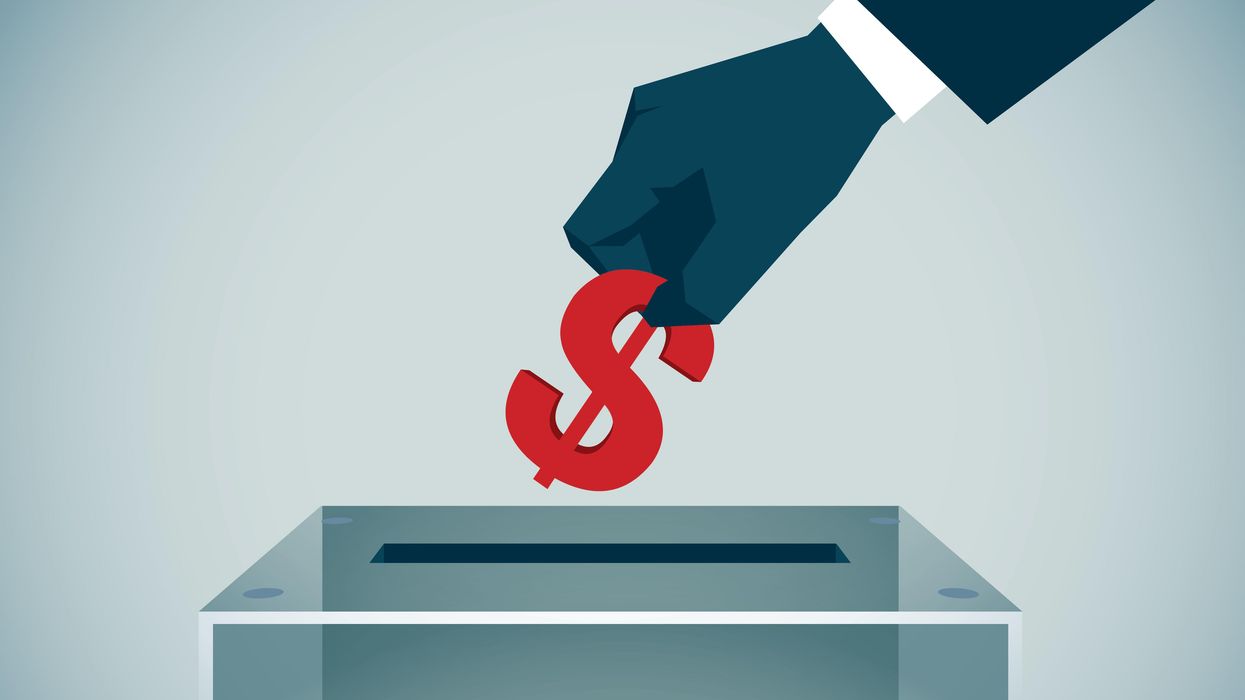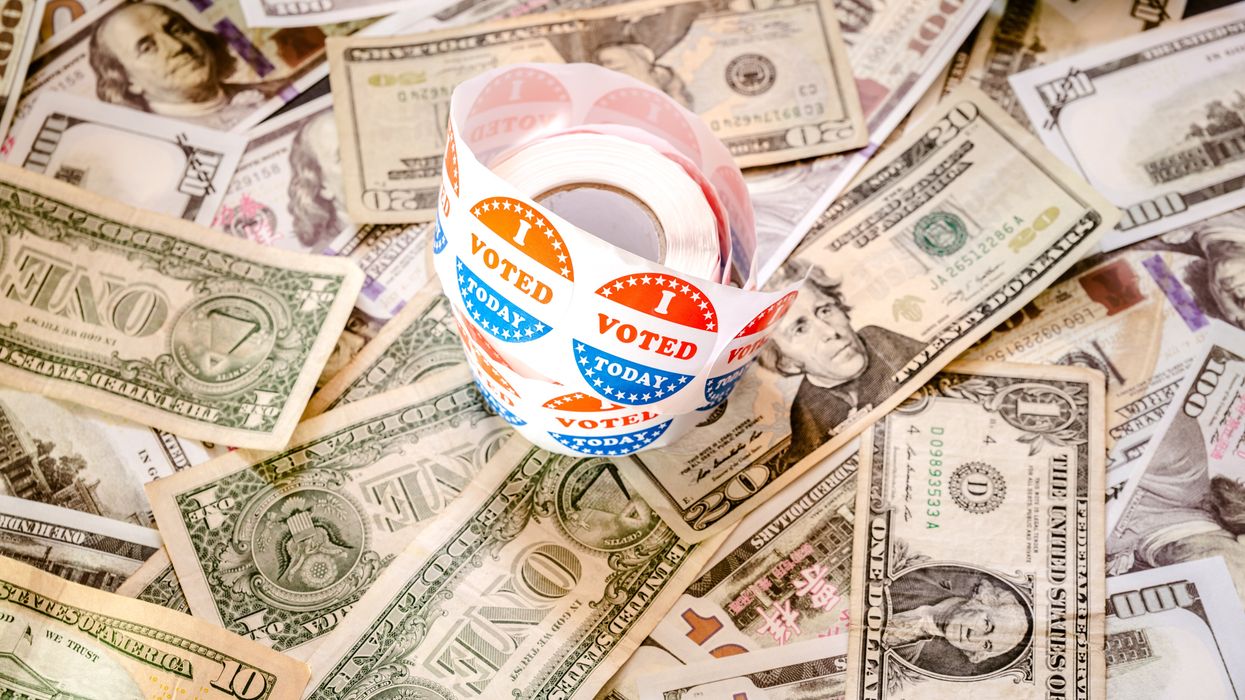As we get into the business of solving problems, it’s important to remove the obstacles that block solutions. One of the biggest hurdles, especially for solutions involving government policies, is the staggering amount of money showered on candidates for public office. The system guarantees that billionaires and big industries are taken care of at the expense of ordinary citizens who lack the resources in this pay-to-play environment.
A couple of examples:
- Legislation and regulations that could rein in climate change and air and water pollution end up being inadequate because of the influence wielded by the fossil fuel and energy sectors that lavish millions in campaign contributions on politicians.
- Affordable health care is stymied by the insurance industry, which would find itself on the losing end with any system — Medicare for all, anyone? — that limits or eliminates the middle man.
One of the more frustrating examples of corporate influence in politics is the difficulty in curbing gun violence in America. When mass shootings were on the rise in the 1990s, federal legislators enacted a ban on assault weapons in 1994, and deaths from mass shootings dropped by 70 percent. The problem, however, was that the ban was not permanent. The law was scheduled to expire after 10 years unless Congress extended the ban. Guess what? Thanks to the coercive lobbying of the National Rifle Association, which is heavily funded by the gun industry, the ban ended in 2004. Since then, our nation has been plagued by tragic incidents in which assault weapons are the instrument of choice, among them the Las Vegas shooting in 2017 (60 deaths), the Pulse nightclub shooting in 2016 (49 deaths) and the Sandy Hook Elementary shooting in 2012 (27 deaths).
The problem of big money in politics grew exceedingly worse in 2010 with the Supreme Court’s decision in Citizens United v. The Federal Elections Commission, allowing corporations and unions to spend unlimited amounts of money on political campaigns. This led to the rise of super PACs (political action committees), which last year spent $2.7 billion on federal elections, the lion’s share on the presidential campaign. Because of loopholes in election regulations, many of these donors — both individual and corporate — remain anonymous by donating to third-party non-profits that do not have to reveal the identity of contributors. These third-party groups then contribute that money to super PACs. Because of this “dark money,” Americans often do not know who is buying our elections (politicians).
Attempts have been made to limit the influence of big money in our elections, but these laws and regulations get struck down in court rulings based on the Citizens United decision.
- In 2012, the U.S. Supreme Court halted a Montana Supreme Court ruling that upheld the state’s century-old law prohibiting corporations from spending money to influence elections. A ballot initiative next year will attempt to circumvent the Citizens United ruling with a state constitutional amendment to redefine the rights of corporations operating in the state. Stay tuned.
- In Maine this year, laws designed to limit contributions to PACs and foreign influence were struck down in federal courts. The super PAC law was approved by 75% of Maine voters in 2024. The law banning foreign governments from spending on campaigns was approved by 86% of Maine voters in 2023.
How do we get out of this mess the Supreme Court created? We need a constitutional amendment that gives state and federal lawmakers the right to enact laws that will get big money out of politics, but that’s a pretty tall order. An amendment proposal must be approved by two thirds of Congress. It must then be ratified by the legislatures of three quarters of the states (38 for the math-impaired among us). Is this really achievable, especially in today’s divisive political environment?
American Promise, an organization working on a constitutional amendment that would enable campaign finance reform, believes it’s possible and is conducting a grassroots campaign in all 50 states.
Their proposal, the For Our Freedom Amendment, does not prescribe any specific policy on limiting campaign contributions or who can give money to campaigns. Instead, the amendment removes restrictions from state and federal lawmakers on legislation to address the problem, laws currently being struck down because of Citizens United. Section 2 of the amendment:
Nothing in this Constitution shall be construed to forbid Congress or the States, within their respective jurisdictions, from reasonably regulating and limiting contributions and spending in campaigns, elections, or ballot measures.
“You need a solution that is flexible enough to recognize that different policymakers may have different ideas about how to tackle the influence of money in politics,” said Brian Boyle, Chief Program Officer and General Counsel for American Promise.
Flexibility is not the only part of American Promise’s strategy. Drawing lessons from the failed attempt to ratify the Equal Rights Amendment, the group is taking a “states-forward” approach to passage of their amendment, with volunteers in the states doing the groundwork before an amendment is sent out for ratification.
“What we learned from [The Equal Rights Amendment] is that when they started their efforts and focused on the proposal by Congress piece, which is sort of chronologically first, it meant that states weren’t necessarily ready or primed to ratify by the time the amendment actually got proposed and sent back to them for ratification. And so we’ve almost added like a preliminary step, which isn’t required by the Constitution, but is actually, in our view, strategically necessary and prudent, which is getting the states ready to ratify as almost the first step.”
Volunteers, supported by American Promise, are working in states to spread the word on the need for a constitutional amendment to restore political power to the people. So far, 23 state legislatures have passed resolutions calling for a measure like the For Our Freedom Amendment. The Wisconsin legislature is expected to vote on such a resolution next month.
The For Our Freedom Amendment has appeal across party lines. Legislatures in red states like Utah, Montana and West Virginia have passed supportive resolutions. With their “state-forward” strategy proceeding according to plan, American Promise is now in preliminary discussions with members of Congress, particularly those on the House and Senate Judiciary Committees expected to take up the amendment. “One observation we’ve heard echoed from offices on both sides of the aisle is a sense that the time is right for this sort of an idea,” said Boyle.
Noting “very strong public support” for an amendment, Boyle said, “The American people know that the system is broken. And so they’re attracted to a solution.”
If you’re one of the Americans who wants to fix our broken system, you can start with American Promise’s Citizen Pledge to support an amendment to get big money out of politics. Beyond that, you can find opportunities to volunteer on their website.
Getting big money out of politics was first published on Steve Valk's Substack channel and republished with permission.
Steve Valk worked for 30 years at the Atlanta Journal-Constitution. A longtime volunteer with RESULTS, Steve was also the Communications Director at Citizens Climate Lobby. You can subscribe to his Substack, "Problem Solved," at stevevalk.substack.com.



















